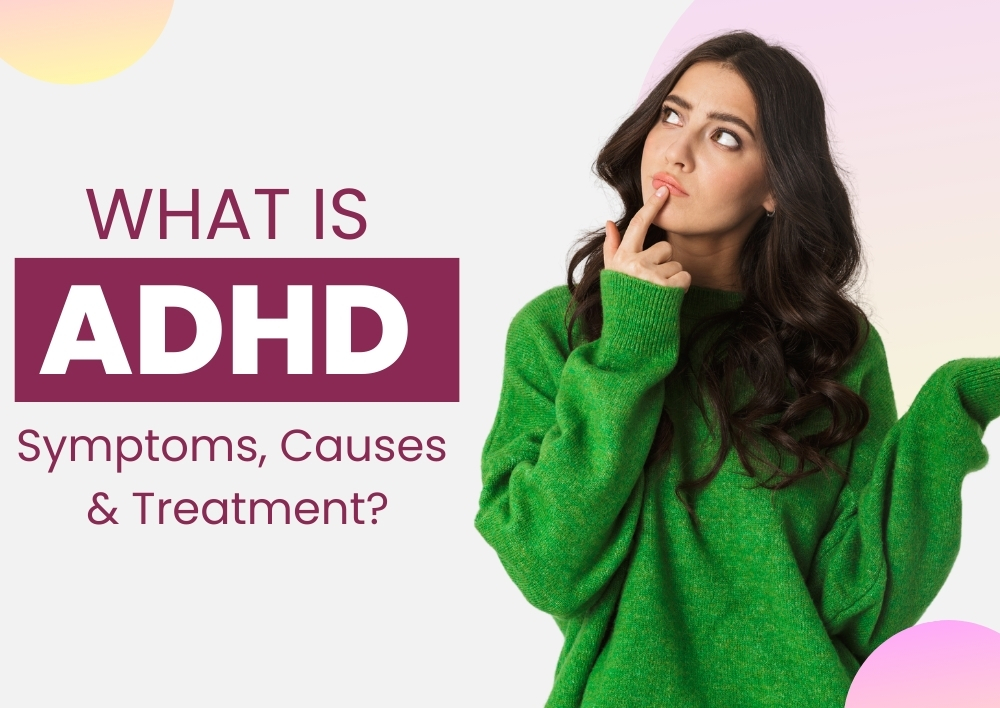What is Attention Deficit Hyperactivity Disorder (ADHD): Symptoms, Causes and Treatment?
Attention Deficit Hyperactivity Disorder (ADHD) is a neurodevelopmental disorder, also known as attention deficit disorder (ADD) that affects both children and adults. This condition makes it hard for individuals to focus, keep still, and think before acting. This condition can impact routine functions, academic performance, work productivity, and social relationships by making it difficult for individuals to focus and manage emotions. In this blog, we will delve into the symptoms, types, and various treatment options available for ADHD.
What is ADHD?
According to the best neurologist in Gurgaon, ADHD is a complex brain-based disorder that is mainly diagnosed in children between the ages of 6 and 12 years and can continue into adolescence and adulthood. It is characterized by difficulty in concentration, hyperactivity, and impulsivity. The exact cause of ADHD is not completely understood, but it is believed to involve a combination of genetic, environmental, and neurological factors.
Types of ADHD:
Attention deficit hyperactivity disorder is of three types such as:
-
Predominantly Inattentive Presentation: This type is indicated by primarily inattentive symptoms without significant hyperactive-impulsive behavior.
-
Predominantly Hyperactive-Impulsive Presentation: Individuals with this type show predominantly hyperactive-impulsive symptoms without significant inattention.
-
Combined Presentation: This is the most common type, involving a combination of both distracted and hyperactive-impulsive symptoms.
ADHD Symptoms in Kids
The symptoms of attention deficit hyperactivity disorder in children can present in various ways and may differ depending on the child's age, developmental stage, and individual characteristics. Here are some common symptoms of attention deficit hyperactivity disorder (ADHD) in children:
-
Inattention:
-
Difficulty sustaining attention in tasks or play activities, especially those that require sustained mental effort.
-
Usually unable to pay close attention to details.
-
Makes careless mistakes in schoolwork, homework, or other activities.
-
Seems not to listen when spoken to directly.
-
Often has difficulty organizing tasks and activities.
-
Avoids, dislikes, or is unwilling to be involved in tasks that require sustained mental effort.
-
Frequently loses items necessary for tasks or activities.
-
Easily distracted by irrelevant stimuli.
-
Forgetfulness in daily activities.
-
-
Hyperactivity:
-
Move restlessly with hands or feet or turn in the seat.
-
Often leaves a seat in situations where remaining seated is expected (e.g., classroom, mealtime).
-
Runs or climbs excessively when it's unsuitable (feeling restless in teens).
-
Difficulty engaging in leisure activities quietly.
-
Talks excessively.
-
-
Impulsivity:
-
Answers suddenly before questions have been completed.
-
Difficulty awaiting turn (e.g., waiting in line).
-
Interrupts on others' conversations or activity.
-
-
Executive Functioning Challenges:
-
Difficulty with organization, such as keeping track of belongings, completing homework assignments, or maintaining a tidy living space.
-
Problems with time management and planning.
-
Difficulty starting tasks or transitioning from one activity to another.
-
Forgetfulness regarding daily activities, chores, or responsibilities.
-
-
Emotional Regulation:
-
Impatience and difficulty waiting for their turn.
-
Frequent mood swings or emotional outbursts.
-
Trouble coping with frustration or disappointment.
-
Low frustration tolerance.
-
Difficulty regulating emotions, leading to intense reactions to situations.
-
-
Academic and Social Challenges:
-
Academic underachievement due to difficulties with attention, organization, and impulsivity.
-
Poor performance in school despite average or above-average intelligence.
-
Difficulty making and maintaining friendships due to social impulsivity or challenges with social cues.
-
It's important to remember that not all children with ADHD will exhibit all of these symptoms, and the severity of symptoms can vary widely. Additionally, some symptoms may change or become more pronounced as the child grows and faces different developmental challenges. If you suspect that your child may have ADHD, seek evaluation and support from an ADHD specialist for proper diagnosis and management.
ADHD Symptoms in Adults
ADHD, often associated with childhood, can persist into adulthood, though symptoms may manifest differently. Here are some common symptoms of ADD in adults:
-
Inattention: Adults with ADHD may struggle to focus on tasks, leading to frequent distractions, difficulty following through on tasks, and making careless mistakes at work or in daily activities. They may have trouble organizing tasks and activities, often seeming forgetful or absent-minded.
-
Hyperactivity: While hyperactivity may diminish with age, some adults with ADHD still experience inner restlessness and difficulty staying still. They may feel restless or constantly on the go, have trouble sitting still for long periods, and engage in excessive talking or fidgeting.
-
Impulsivity: Impulsivity in adults with ADHD can manifest in various ways, such as impulsively making decisions without considering consequences, interrupting others during conversations, or engaging in risky behaviors like reckless driving or substance abuse.
-
Procrastination and Poor Time Management: Adults with ADHD often struggle with time management and procrastination. They may have difficulty prioritizing tasks, estimating how long tasks will take, and meeting deadlines. This can lead to chronic lateness and difficulties in both personal and professional settings.
-
Difficulty with Organization: Adults with ADHD may struggle to stay organized, leading to cluttered workspaces, missed appointments, and difficulty managing finances or household responsibilities. They may have trouble keeping track of important documents or remembering where they put things.
-
Impaired Executive Functioning: Executive functions such as planning, problem-solving, and decision-making may be impaired in adults with ADHD. They may have trouble setting goals and following through on them, leading to a sense of underachievement or frustration with unfulfilled potential.
-
Mood Swings and Emotional Dysregulation: Adults with ADHD may experience mood swings, irritability, and emotional dysregulation. They may have difficulty managing their emotions, leading to outbursts of anger or frustration, or periods of sadness or anxiety.
-
Relationship Difficulties: ADHD can strain relationships due to communication challenges, forgetfulness, and difficulty managing emotions. Adults with ADHD may struggle to listen attentively, follow through on commitments, or remember important dates and events, leading to conflicts with partners, family members, or coworkers.
-
Low Self-Esteem and Self-Concept: Constant struggles with ADHD symptoms can take a toll on an adult's self-esteem and self-concept. They may feel inadequate or misunderstood, leading to feelings of frustration, shame, or depression.
It's important to note that not all adults with ADHD will experience all of these symptoms, and the severity of symptoms can vary widely from person to person. Additionally, many adults with ADHD develop coping mechanisms and strategies to manage their symptoms effectively, leading to successful personal and professional lives.
ADHD Causes
Understanding the causes of Attention Deficit Hyperactivity Disorder (ADHD) is complex, involving a combination of genetic, environmental, and neurobiological factors. While the precise etiology of ADHD remains incompletely understood, research has identified several potential contributing factors:
-
Genetics: There is strong evidence to suggest that genetics play a significant role in the development of ADHD. Studies have shown that ADHD tends to run in families, with a heritability estimate of around 70-80%.
-
Neurobiology: Neuroimaging studies have revealed differences in brain structure and function in individuals with ADHD compared to those without the disorder. Areas of the brain implicated in ADHD include the prefrontal cortex (responsible for executive functions such as impulse control and decision-making), the basal ganglia (involved in motor control and reward processing), and the neurotransmitter systems, particularly those involving dopamine and norepinephrine.
-
Prenatal and Perinatal Factors: Certain prenatal and perinatal factors have been associated with an increased risk of attention deficit hyperactivity disorder. These include maternal smoking, alcohol consumption, or substance abuse during pregnancy, prematurity, low birth weight, maternal stress or depression during pregnancy, and exposure to environmental toxins such as lead or pollutants. Complications during childbirth, such as hypoxia or fetal distress, have also been linked to ADHD.
-
Environmental Influences: While genetics play a significant role, environmental factors can also contribute to the development of ADHD. Factors such as early childhood adversity, including neglect, abuse, or trauma, family dysfunction, chaotic home environments, high levels of family conflict, and inconsistent parenting practices may increase the risk of ADHD symptoms or exacerbate existing symptoms.
-
Brain Injury or Trauma: Traumatic brain injury (TBI) or other forms of brain injury may increase the risk of developing ADHD, particularly in children. Damage to areas of the brain responsible for attention, impulse control, and executive functions can result in ADHD-like symptoms. However, not all cases of ADHD can be attributed to brain injury or trauma.
-
Other Medical Conditions: Certain medical conditions or comorbidities may coexist with ADHD and contribute to its development or exacerbation. These include sleep disorders, anxiety disorders, mood disorders, learning disabilities, and developmental disorders such as autism spectrum disorder (ASD).
ADHD Diagnosis
Diagnosing Attention Deficit Hyperactivity Disorder (ADHD) involves a comprehensive evaluation process that typically includes gathering information from multiple sources, including the individual, parents or caregivers (for children), teachers, and other relevant sources. Here's an overview of the steps involved in the ADHD diagnosis process:
-
Initial Assessment: The diagnostic process often begins with a thorough assessment conducted by a qualified healthcare professional, such as a psychiatrist, psychologist, pediatrician, or primary care physician. The healthcare provider will gather information about the individual's medical history, developmental milestones, academic and social functioning, and any symptoms suggestive of ADHD.
-
Diagnostic Criteria: To meet the criteria for an ADHD diagnosis, the individual must show a persistent pattern of inattention and/or hyperactivity-impulsivity that significantly impairs functioning and is inconsistent with their developmental level.
-
Symptom Assessment: The healthcare provider will assess the individual's symptoms of ADHD using standardized rating scales, such as the ADHD Rating Scale or the Conners' Rating Scale. These scales are often completed by parents, teachers, and the individual themselves (if age-appropriate) to gather information about the presence and severity of ADHD symptoms in different settings.
-
Rule Out Other Conditions: Because ADHD symptoms can overlap with other medical, psychiatric, and developmental conditions, it's essential to rule out alternative explanations for the symptoms. Common conditions that may mimic or coexist with ADHD include anxiety disorders, mood disorders, learning disabilities, autism spectrum disorder (ASD), and sleep disorders. A thorough medical and psychiatric evaluation may be necessary to differentiate ADHD from these other conditions.
-
Medical Evaluation: A comprehensive medical evaluation may be conducted to rule out any underlying medical conditions that could be contributing to the individual's symptoms. This may include a physical examination, laboratory tests, and neuroimaging studies (such as MRI or CT scans) in certain cases.
-
Developmental History: Obtaining a detailed developmental history is crucial in diagnosing ADHD, particularly in children. Information about prenatal and perinatal factors, developmental milestones, academic performance, and social functioning can provide valuable insights into the nature and onset of the individual's symptoms.
-
Collateral Information: In addition to gathering information directly from the individual, collateral information from parents, caregivers, and teachers is often instrumental in the diagnostic process. Reports of the individual's behavior in different settings can help corroborate the presence of ADHD symptoms and their impact on daily functioning.
-
Multimodal Assessment: Given the heterogeneity of ADHD and its complex presentation, a multimodal assessment approach that integrates information from multiple sources and assessment tools is often recommended. This comprehensive approach helps ensure a thorough evaluation and accurate diagnosis of ADHD.
The diagnosis of ADHD should be made by a qualified ADHD specialist based on a comprehensive evaluation of the individual's symptoms, history, and functioning. A careful and systematic approach to diagnosis is essential to ensure that individuals receive appropriate treatment and support tailored to their specific needs.
ADHD Treatment
Treating Attention Deficit Hyperactivity Disorder (ADHD) typically involves a multimodal approach that combines medication, behavioral therapy, educational interventions, and support services. The goal of treatment is to reduce ADHD symptoms, improve functioning in daily activities, and enhance overall quality of life. Here's an overview of the various treatment options for ADHD:
-
Medication:
-
Stimulant Medications: Stimulant medications such as methylphenidate (e.g., Ritalin, Concerta) and amphetamine-based medications (e.g., Adderall, Vyvanse) are often considered first-line treatments for ADHD. These medications work by increasing the levels of dopamine and norepinephrine in the brain, helping to improve attention, focus, and impulse control. They are available in short-acting, intermediate-acting, and long-acting formulations, allowing for flexibility in dosing and duration of action.
-
Non-Stimulant Medications: For individuals who do not respond well to or cannot tolerate stimulant medications, non-stimulant medications such as atomoxetine (Strattera), guanfacine (Intuniv), and clonidine (Kapvay) may be prescribed. These medications work by targeting different neurotransmitter systems involved in ADHD and may be particularly beneficial for individuals with comorbid conditions such as anxiety or tics.
-
-
Behavioral Therapy:
-
Cognitive-Behavioral Therapy (CBT): CBT focuses on teaching individuals with ADHD practical skills and strategies to manage their symptoms more effectively. This may include techniques for improving organization and time management, developing problem-solving skills, enhancing social skills, and coping with emotional dysregulation.
-
Parent Training: Parent training programs provide parents with education and support in managing their child's ADHD symptoms. These programs typically teach behavior management techniques, effective communication strategies, and ways to create a structured and supportive home environment.
-
Behavioral Interventions: Behavioral interventions such as contingency management, token economy systems, and positive reinforcement techniques may be used to encourage desired behaviors and discourage negative behaviors in individuals with ADHD.
-
-
Educational Support:
-
Individualized Education Plan (IEP) or 504 Plan: For school-age children with ADHD, an IEP or 504 plan can provide accommodations and support services to help address academic challenges related to ADHD. This may include modifications to the classroom environment, extended time on tests, preferential seating, and specialized instruction tailored to the individual's needs.
-
School-Based Interventions: School-based interventions such as behavior management strategies, social skills training, and executive function coaching can help support academic success and social functioning in children with ADHD.
-
-
Lifestyle Modifications:
-
Regular Exercise: Engaging in regular physical activity can help reduce hyperactivity, improve mood, and enhance cognitive functioning in individuals with ADHD.
-
Healthy Diet: A balanced diet rich in nutrients, particularly omega-3 fatty acids and antioxidants, may have beneficial effects on ADHD symptoms. Limiting the intake of processed foods, sugar, and artificial additives may also be helpful.
-
Consistent Sleep Schedule: Establishing a consistent sleep schedule and practicing good sleep hygiene habits can improve sleep quality and overall functioning in individuals with ADHD.
-
-
Support Groups and Counseling:
-
Support Groups: Joining support groups or participating in peer support networks can provide individuals with ADHD and their families with emotional support, practical advice, and a sense of community.
-
Counseling: Individual or family counseling may be beneficial for addressing emotional issues, improving coping skills, and enhancing communication within the family.
-
-
Complementary and Alternative Therapies:
-
Some individuals with ADHD may benefit from complementary and alternative therapies such as mindfulness meditation, yoga, biofeedback, and neurofeedback. While the evidence supporting the effectiveness of these approaches varies, some people find them helpful as adjunctive treatments for managing ADHD symptoms.
-
The treatment for ADHD should be individualized based on the specific needs and preferences of the individual, taking into account factors such as age, symptom severity, comorbid conditions, and treatment response. Regular monitoring and follow-up with a qualified healthcare professional are essential to assess treatment effectiveness, adjust medication dosages if necessary, and address any emerging concerns or challenges. With comprehensive treatment and support, many individuals with ADHD can effectively manage their symptoms and lead fulfilling lives.
Conclusion:
ADHD is a multifaceted disorder that can have significant impacts on various aspects of life. However, with the right combination of medication, therapy, and support, individuals with ADHD can learn to manage their symptoms effectively and lead fulfilling lives.
If you or someone you know is struggling with ADHD symptoms, don't hesitate to seek help. Contact the best neurologist near you at Miracles Healthcare for a comprehensive evaluation and personalized treatment plan. Taking action can lead to better management of symptoms and improved quality of life.














Was the information useful?
0 0